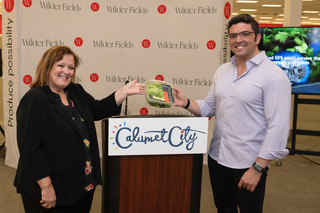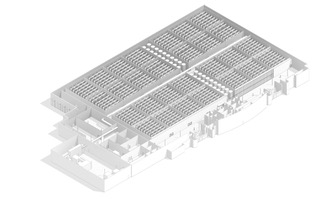
Calumet City Old Target Building Will Become The First Vertical Farm
Michelle Markiewicz Qualkinbush, Mayor of the City of Calumet City, and Jake Counne, founder of Wilder Fields, announced a commitment to build and operate its first full-scale commercial vertical farm in a former Super Target store, located in a shopping center at 1717 E. West Road in Calumet City.
Counne started by touring an empty, massive manufacturing building in south suburban Blue Island, Ill., in 2016, Counne, founder of Wilder Fields, began thinking about how to repurpose abandoned but very usable indoor expanses. But instead of that former manufacturing facility, Counne’s first full-scale commercial vertical farm will revitalize an empty Target store in a suburb just south of Chicago.
Wilder Fields will build out the 135,000 square-foot former big box store in Calumet City. The store which sat vacant for the last 5 years was a perfect opportunity to revitalize the area. The majority of space will house 24 separate cleanrooms for growing dozens of varieties of greens. The site also includes a retail store and education center for the citizens of Calumet City and other consumers. In addition, a research laboratory sustains Wilder Fields’ leading-edge approach to vertical farming, and a large loading dock provides a hub for distributing produce to supermarkets and select restaurants within 100 miles of this next-generation vertical farm.
Construction is planned for two phases. Phase one, to be completed in early 2021, includes building critical infrastructure and an initial group of cleanrooms. Each 105,000 cubic-foot cleanroom will house eight levels of growing space along with the proprietary technology created by Wilder Fields’ experts to provide a safe and efficient growing environment. The second phase will be completed in early 2023.
The enterprise is funded by Counne and a group of strategic private investors. The total cost for the Wilder Farms’ first facility is estimated at $40 million, according to Counne.
Wilder Fields was called Backyard Fresh Farms when it started, close to four years ago, in one 2,500 square-foot room in The Plant, an incubator located in Chicago’s Back- of-the-Yards neighborhood. Counne and one private investor bootstrapped this start-up phase with close to $2 million.
According to Counne, the new name conveys his company’s intention to amplify Mother Nature’s gifts; to build its vertical farms in markets that will benefit from its private investment; and to expand consumers’ ideas about the taste and variety of fresh greens with many flavor profiles they have never experienced.
During this initial period of development and proof of concept, the start-up’s multi- disciplinary team created software and hardware to introduce a new approach to vertical farming. Currently multiple patents are pending. The team devised ways to use artificial intelligence to apply the principles of machine learning and machine visioning to farming. The team’s approach yielded ways to monitor round-the-clock the plants’ health and growing environment while reducing human contact.
“Our team is very passionate about our mission. We are so fortunate that the lead talent we recruited early in our first phase continues to tackle new opportunities to expand and improve on what they already have invented,” states Counne.
“I consider Wilder Fields to be a problem-solver. We don’t take anything for granted. We continue to explore many alternatives to the accepted ways of running a vertical farm. Without overengineering them, we continue to create fresh, elegant solutions,” says Counne.
“When I learned about the possibility of acquiring a Super Target store in Calumet City, I knew it would be the perfect choice for building Wilder Fields’ first full-scale commercial vertical farm,” says Counne. “From the very beginning, we have developed our system to be flexible enough to fit existing buildings, including anchor retail spaces like this one.”
“We will blow people’s minds with varieties and flavors that they have never tasted, because those greens would have never survived the journey to their plate. Eating healthy won’t need to be a chore, it will be a joy,” Counne said.
“We’ll be bringing back lost jobs. We’ll employ the underemployed. And not just providing entry level jobs, but creating a training path to real upward job advancement in the Agtech industry.”
“We want to grow more than just produce. We want to help the communities where we build our farms grow as well,” Counne stated.


